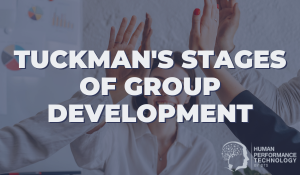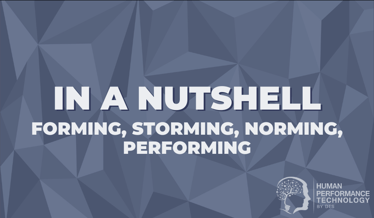In a Nutshell: Four Stages of Competence
The four stages of competence model does not have a single, definitive title and may also be referred to as the four stages of learning, the conscious competence model, or the competence learning matrix.
The model has several competing claims of original authorship, several (sometimes contradictory) ways of explaining each stage, several suggestions for re-labelling the stages as well as for adding a fifth.
A frequent submission of original authorship comes from Gordon Training International, claiming that the model was developed by Noel Burch, a former employee, who published the “Teacher Effectiveness Training Instructor Guide” in the 1970s. However, Businessballs.com indicates that the earliest recorded documentation would seem to belong to Martin M. Broadwell who outlined “four levels of teaching” in a 1969 article titled “Teaching For Learning.” Broadwell describes a teacher who is lecturing in a “dull, monotone manner, unaware that he is wasting his time and the students.” Broadwell briefly explores four stages in sequence where the man follows the path to becoming a “master teacher.” At first, he is the "Unconscious Incompetent," then the “Conscious Incompetent,” followed by the "Conscious Competent," and finally the "Unconscious Competent."
Some similarities exist between this model and the Johari Window. The latter tends to be used as a team building exercise whereas this model tends to be used as a more general description of the learning process itself. Both models are complementary.
Overview:
The four stages of competence model has a number of different interpretations but typically suggests that there are four stages to learning any new skill:
- S1: Unconscious Incompetence: unaware of skill and lacking proficiency
- S2: Conscious Incompetence: aware of the skill but lacking proficiency
- S3: Conscious Competence: aware of the skill and proficient with effort
- S4: Unconscious Competence: aware of the skill and proficient with ease
Stage 1: Unconscious Incompetence
There are two main ways of interpreting this stage. The first is seen as learning something for the very first time. That is, learning an activity that we have never done before. The second interpretation is performing an activity that we have done before and (think) we already know how to do it, but are, in actual fact, doing it very badly, unaware of what competence really looks like. In either case, the distinguishing feature of this stage is ignorance: we don’t know what we don’t know.
Stage 2: Conscious Incompetence
We enter this stage as soon as we become aware of what we don’t know. We learn about the existence of the skill (or how the skill should be performed). It is here that we can now assess the full extent of our skill deficiency and decide whether or not we wish to make a concerted effort to learn. For example, we might decide that the best way to master the activity is to find a mentor, instructor or subject matter expert. We may begin practicing the skill with help or on our own, but we cannot yet be called "competent." We are most likely known as a novice, amateur or beginner. The difficultly involved in learning the new activity could make us feel uncomfortable, awkward or silly at times, potentially causing us to quit.
Stage 3: Conscious Competence
In this stage, we have achieved competence, although it requires careful attention and effort. We may know how to perform the skill the right way, yet still need to work hard to get results. Mistakes may still occur, but not at the same rate as in stage 2. We are experimenting, learning and reviewing our progress. The length of time spent in this stage before progressing to the next will depend on how quickly we are able to "hardwire" the skill into our physical and/or mental processes.
Stage 4: Unconscious Competence
In this stage, we have acquired full mastery. The skill has become automatic. There is little or no conscious effort required to perform proficiently. The skill has become natural or like "second nature." Our intuitive understanding of all aspects of the activity means that we can adapt and improvise quickly in the face of new, unfamiliar situations. If someone were to ask us how we do it, we might shrug and say that we’re not really sure — we just do.
Carole Schubert offers the following analogy of driving a car to help explain the four stages:
- S1: Non-driver
- S2: Beginner
- S3: Just passed driving test
- S4: Driver who gets to work without remembering the drive
A fifth level is also suggested by Schubert (as well as other authors) who describes a stage where the learner is cognisant of his or her mastery and can explain the functional processes as they happen, which is not typically part of the description in the standard model. Some authors prefer to re-label the stages altogether, such as Rey Carr, who uses the terms "unskilled," "skilled," "competent," and "expert." This eliminates some of the confusion between stages for the layperson with terms that are more relatable and easy to remember.
For most complex skills, like computer programming, public speaking, flying a plane, playing golf or ice skating, people will need to spend a significant amount of time in stage 3 — many months or even years before they can progress to stage 4, where the skill becomes natural. People can also regress to a previous stage (e.g., from stage 4 to stage 3) if they fail to continue practicing.
Perhaps the most important stage for teachers, coaches and trainers to focus on is stages 2 — recognising when someone understands what the skill is, but does not see any advantage in learning how to do it. A facilitator involved in workplace training may also be faced with the prospect of a group that feigns interest in learning or be described as "going through the motions" in order to achieve a particular certification standard. For this reason, it may be worthwhile to help learners examine the personal benefit of learning the skill (or the risks of not learning) at the very outset of the learning experience.
Sources:
- Conscious Competence Learning Model (Businessballs.com)
- Teaching For Learning (XVI.), The Gospel Guardian, Volume 20, Martin M. Broadwell, February 20, 1969
- Learning a New Skill is Easier Said Than Done, Linda Adams (President of Gordon Training International)
- The Conscious Competence Ladder (Mindtools.com)
- Conscious and Competence (Changingminds.org)
- Four Stages of Competence (Wikipedia.com)
- The Conscious Competence Learning Model (1970s), Dr. Ramesh Mehay, Programme Director (Bradford), 2010
This article offers an expanded description of the summary listed in our post 40 Must-Know HR, OD, L&D Models.

Theo Winter
Client Services Manager, Writer & Researcher. Theo is one of the youngest professionals in the world to earn an accreditation in TTI Success Insight's suite of psychometric assessments. For more than a decade, he worked with hundreds of HR, L&D and OD professionals and consultants to improve engagement, performance and emotional intelligence of leaders and their teams. He authored the book "40 Must-Know Business Models for People Leaders."



We Would Like to Hear From You (0 Comments)